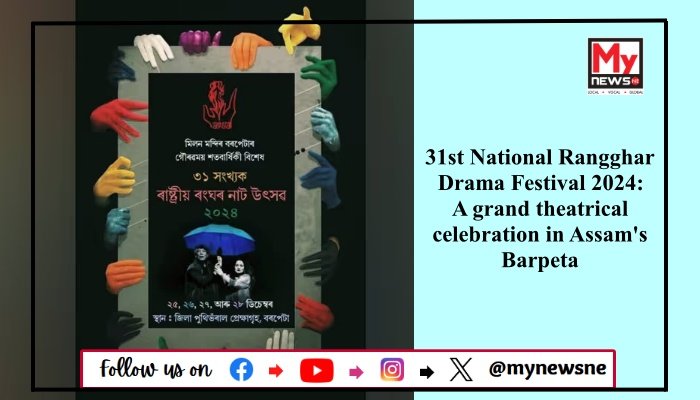31st National Rangghar Drama Festival to Celebrate Assam’s Theatrical Legacy
Assam: The 31st National Rangghar Drama Festival, a highlight of Assam’s cultural scene, is set to captivate audiences with a blend of regional and national theatrical brilliance.
Scheduled from December 25 to 28, 2024, this prestigious event will be held at Barpeta’s District Library Auditorium, celebrating the rich heritage of Indian theater while honoring the 100th anniversary of Milan Mandir, a cornerstone of Assam’s dramatic arts.
Organized by Ronghar, a leading cultural institution, the festival will feature seven thought-provoking productions, each presenting a unique lens on societal and personal narratives. The opening night will showcase Menaka, an adaptation of Homen Borgohain’s novel Matsyagandha, dramatized by Jimoni Choudhury and Pakija Begum, and directed by Pakija Begum. This Guwahati-based production, with its evocative storytelling, promises a powerful start to the event.
The second day delves into Assamese theater’s regional diversity, beginning with Raghunath, a moving exploration of human relationships and societal issues, written and directed by Bidyut Kumar Nath of Abhimukh, Nagaon. The day continues with Maurot Nojowa Keitar Kahini by Dergaon Natyacharcha Kendra, which examines cultural dilemmas through a minimalist yet impactful narrative by Saponjyoti Thakur.
Day three expands the festival’s scope with Comfort Women, a poignant production by Abhijnanam, Guwahati, directed by Ronhang Choudhury. The play sheds light on wartime exploitation, offering a profound theatrical experience. The evening concludes with Atmavat, a Kolkata-based production by Kalpana, Tiljala, written by Buddhadeb Basu and directed by Kalpana Baruah, exploring themes of identity and self-realization.
The final day bridges international influences and modern interpretations. Mumbai’s Act 24 will present Jina Isi Ka Naam Hai, a Hindi adaptation of Arbuzov’s Russian play Old World (Do You Turn Somersaults?), directed by Suresh Bhardwaj. The festival concludes with The Zoo Story, Edward Albee’s classic adapted by Panchkochi, New Delhi, under the direction of Utpal Jha. Both plays explore themes of human connection and alienation, providing a compelling close to the festival.
As it blends regional storytelling with national and global perspectives, the 31st National Rangghar Drama Festival promises to be a transformative celebration of theater. By uniting tradition and innovation, it reaffirms drama’s enduring ability to reflect, challenge, and inspire society.

